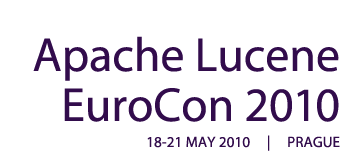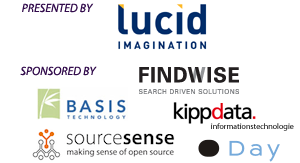
|

General Session Presentations:
| The Search Revolution: How Lucene & Solr Are Changing The World |
|

Eric Gries
 Slides Slides
|
|
The data and content whirlwind continues unabated, with total data volume is doubling every 18 months, mutating into more forms and formats every day, as end users and organizations alike continue to demand better search technology. Now the Lucene Revolution has arrived, freeing end users and organizations to harness the content whirlwind with better, faster, more scalable and effective search apps and search-enabled services. More and more enterprises are breaking the bonds of commercial proprietary software lock-in, scaling up on open source Lucene/Solr search technology. Thousands are betting their business on the promise and the results delivered by the community innovation engine for disruptive competitive advantage. We'll look at how cutting edge developers, thought leaders, and market makers who have found the search they've been looking for, are driving the Lucene Revolution around the world.
Speaker bio: Eric Gries joined Lucid Imagination as the President and CEO, after spending more than 20 years in executive leadership roles, where he built high-growth technology-based businesses. Prior to joining the company, Eric was an Executive-in-Residence at Granite Ventures. Eric has served as CEO, general manager and vice president for companies in application development, systems management, networking, financial services and hardware systems, in both the U.S. and Europe. Prior to joining Granite Ventures, Eric led XACCT, a pioneering network mediation market leader, as its president and CEO. XACCT was acquired by Amdocs in 2004, at which time Eric joined Amdocs' executive team as Senior Vice President. Earlier in his career, Eric served as general manager of Compuware's Network and Systems Management division, and held product management, marketing, sales and engineering positions at companies such as ACI, Cullinet Software and DEC.
|
| From Publisher To Platform: How The Guardian Used Content, Search, and Open Source To Build a Powerful New Business Model |

|

Stephen Dunn
 Slides Slides
|
|
Last year The Guardian launched The Open Platform, a suite of services and tools that enable content partners and developers to build applications leveraging The Guardian's rich content. The first two products released as part of the platform are the Content API and the Data Store. The content API contains XML, JSON, and ATOM representations of all The Guardian articles back to 1991 - over 1 million articles. The DataStore contains curated data sets for use in applications and virtualizations. This talk will cover how The Guardian opened up their content, enriched it, and reached new markets with it's platform strategy. Stephen will cover the technical architecture, implementation of Solr, and how The Guardian has embraced disruption in the media space, while at the same time accelerating revenue.
Speaker bio: Stephen Dunn is Head of Technology Strategy for Guardian News and Media in the UK. He joined The Guardian in 1999 and has helped guide the technology strategy for it's multiple award winning network of web sites and services since. At the Guardian Stephen has led several strategic platform initiatives, including the rebuild of the technical and information architecture powering Guardian.co.uk on open web principles - which is the foundation of the the Guardian's Open Platform content API, and the recent program to introduce Open Source search technology as a key platform component. Prior to joining the Guardian, Stephen completed his PhD at the Center for Computational Neuroscience and Robotics at Sussex Univ., UK.
|
| Software Disruption: How Using Open Source, Search, Big Data and Cloud technology are Disrupting IT |

|

Zack Urlocker
 Slides Slides
|
|
While there has been tremendous consolidation in the software industry in the last 10 years, we're also seeing the emergence of disruptive technologies that are changing the rules of competition. Open Source software, combined with cloud computing, software-as-a-service, search and big data, are enabling new disruptive opportunities for developers and entrepreneurs. But despite the hype, not every new technology is actually disruptive. This talk will explain what it takes to create a disruptive strategy and provides examples of how "good enough" solutions can challenge incumbents and create large markets for new products.
Speaker bio: Zack Urlocker is an investor, advisor and board member to several software companies. He was previously the Executive Vice President of Products at MySQL, responsible for Engineering and Marketing of all products worldwide. At MySQL, Urlocker developed MySQL's business model and helped grow revenues to more than $100 million. MySQL was sold to Sun Microsystems for $1 billion and is now part of Oracle corporation. Mr Urlocker has been in the software business for more than 20 years with executive positions at Active Software, webMethods and Borland. He is an occasional blogger, marathon runner, century cyclist and collector of guitars and old computers.
|
| Solr 1.5 and Beyond |

|

Yonik Seeley
 Slides Slides
|
|
The Solr/Lucene community is hard at work designing and developing a range of new features and fixes for Apache Solr, advancing the frontiers of search. Solr creator Yonik Seeley will provide a preview survey of these developments, and talk about how one can leverage new functionality. Topics will include new faceting functionality, new function queries, increased scalability, field collapsing, and spatial search. There will also be a discussion about the recently announced Lucene/Solr merge, the rationale, its implications, and plans for its completion. The talk will span features already included in trunk, features slated for the next release, as well as incomplete features under consideration for future releases.
Speaker bio: Yonik Seeley, creator of Solr, is an expert in distributed search systems architecture and performance. Yonik has been a prolific Lucene/Solr committer, a member of the Lucene PMC, and a member of the Apache Software Foundation. Yonik’s work experience includes CNET Networks, BEA and Telcordia. He earned his M.S. in Computer Science from Stanford University. Yonik is co-founder of Lucid Imagination.
|
|

|

|


Agenda & Session Information
Agenda Overview
General Sessions
Track 1: Day 1 | Day 2
Track 2: Day 1 | Day 2
Training
General Session Presentations:
|

|





